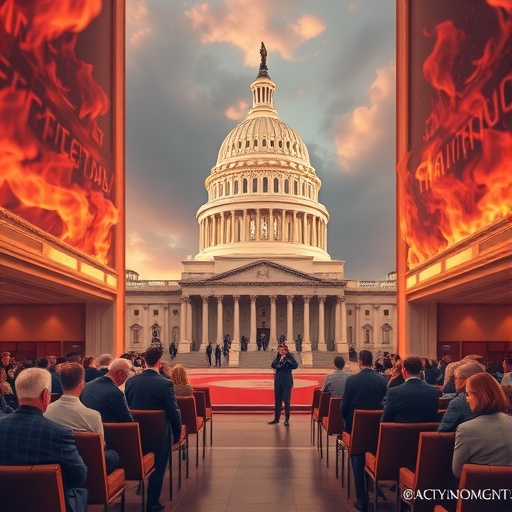Bipartisan Health Care Bills Stall in Congress Amid Shutdown Chaos and Partisan Clashes
In a striking display of cross-aisle cooperation overshadowed by political turmoil, Democratic Representative Diana DeGette and Republican Representative Morgan Griffith are championing Bipartisan health care legislation aimed at addressing pressing issues like prescription drug affordability and mental health access. Yet, as the U.S. government teeters on the brink of another shutdown, these promising bills face an uncertain path forward, trapped in the quagmire of congressional gridlock and partisan disputes.
- DeGette and Griffith Forge Unlikely Alliance on Drug Pricing Reform
- Shutdown Looms as Barrier to Mental Health Access Bill
- Partisan Disputes Derail Broader Bipartisan Momentum in Congress
- Stakeholders Rally for Swift Action on Stalled Legislation
- Outlook Hinges on Budget Breakthrough: Next Steps for Health Care Progress
The duo’s efforts highlight a rare glimmer of unity in a deeply divided Congress, but with key measures awaiting crucial hearings and votes, advocates warn that delays could exacerbate the nation’s health care challenges. As federal funding hangs in the balance, the shutdown threat looms large, potentially derailing progress on reforms that could benefit millions of Americans struggling with rising medical costs.
DeGette and Griffith Forge Unlikely Alliance on Drug Pricing Reform
At the heart of this Bipartisan push is the Health Care PRICE Transparency Act, a bill co-sponsored by Rep. DeGette of Colorado and Rep. Griffith of Virginia. Introduced earlier this year, the legislation seeks to curb skyrocketing prescription drug prices by mandating greater transparency in pharmaceutical pricing negotiations between drugmakers, insurers, and pharmacy benefit managers. According to a 2023 report from the Kaiser Family Foundation, prescription drug costs account for nearly 10% of total U.S. health care spending, totaling over $400 billion annually, with patients often bearing the brunt through high out-of-pocket expenses.
“We’ve seen too many families bankrupted by the simple act of staying alive,” DeGette said in a recent statement to reporters on Capitol Hill. “This bill isn’t about politics; it’s about putting patients first and ensuring that bipartisan solutions can cut through the noise.” Griffith echoed this sentiment, emphasizing the shared Republican and Democratic frustration with opaque pricing practices. “As a father and grandfather, I know the pain of watching loved ones struggle with unaffordable meds,” he noted during a virtual town hall last month. “It’s time for Congress to act, regardless of party lines.”
The bill has garnered support from a diverse coalition, including the American Medical Association and patient advocacy groups like the American Cancer Society. However, its path has been rocky. Originally slated for a House Energy and Commerce Committee hearing in late October, the session was postponed indefinitely due to escalating debates over the federal budget. With the current continuing resolution set to expire imminently, the specter of a government shutdown—now in its third iteration this fiscal year—has only intensified the delays.
Experts point out that such bipartisan health care legislation could save taxpayers billions. A study by the Congressional Budget Office (CBO) estimates that enhanced pricing transparency could reduce Medicare spending on drugs by up to $100 billion over the next decade. Yet, without swift action, these savings remain theoretical, leaving vulnerable populations in limbo.
Shutdown Looms as Barrier to Mental Health Access Bill
Compounding the challenges is another key piece of bipartisan health care legislation: the Mental Health Parity and Access Improvement Act, also led by DeGette and Griffith. This bill aims to strengthen enforcement of the Mental Health Parity and Addiction Equity Act of 2008, which requires insurers to cover mental health services on par with physical health treatments. Despite the law’s existence, a 2022 Government Accountability Office (GAO) investigation revealed that only 36% of mental health claims are processed as equitably as physical ones, leading to widespread denials and barriers to care.
The timing couldn’t be worse. As Congress grapples with a potential shutdown triggered by disagreements over border security funding and disaster relief appropriations, non-essential committee activities—including hearings on this bill—have been scaled back. “The shutdown isn’t just about closed national parks; it’s halting vital health care discussions that affect every American,” said Dr. Elena Ramirez, a policy analyst at the Bipartisan Policy Center. In an interview, she highlighted how the current impasse mirrors broader dysfunction, with House Speaker Mike Johnson’s slim Republican majority struggling to unify on even routine measures.
Statistics underscore the urgency: The National Alliance on Mental Illness reports that 1 in 5 adults experiences mental illness each year, yet access to treatment remains uneven, particularly in rural areas represented by Griffith. The bill proposes targeted funding boosts—$500 million annually—for community mental health centers and telehealth expansions, measures that could prevent an estimated 20,000 suicides linked to untreated conditions, per CDC data.
Stakeholders are sounding alarms. “We’ve waited too long for parity to mean something real,” remarked Sarah Thompson, executive director of the Mental Health Association. During a press briefing, she urged lawmakers to prioritize the vote, even as partisan sniping dominates headlines. Democrats accuse Republicans of using the shutdown threat to leverage unrelated policy wins, while GOP leaders counter that Democratic spending demands are fueling the crisis.
Partisan Disputes Derail Broader Bipartisan Momentum in Congress
The broader context of congressional gridlock reveals deep fissures that are stalling not just these bills but a host of bipartisan health care initiatives. With the 118th Congress marked by record-low productivity—passing only 27 laws in its first session, according to GovTrack—the environment for compromise is toxic. The ongoing budget battles, exacerbated by hardline conservative demands for spending cuts, have led to multiple near-shutdowns, each eroding trust and delaying legislative work.
Rep. DeGette, a senior member of the Energy and Commerce Committee, has been vocal about the frustration. In a floor speech last week, she lamented, “Bipartisan health care legislation like ours should be a beacon of progress, not a casualty of shutdown politics.” Griffith, serving on the same committee, has similarly criticized the dysfunction, pointing to a recent failed vote on a farm bill extension that indirectly impacts rural health services.
Historical parallels abound. During the 2018-2019 shutdown—the longest in U.S. history—health research funding at the National Institutes of Health was slashed by 15%, delaying clinical trials and costing lives. Today, similar risks loom for the Affordable Care Act’s stability and Medicaid expansions, which bipartisan talks have eyed for tweaks. A Pew Research Center poll from November shows 68% of Americans disapprove of Congress’s handling of health care, with bipartisan support for reforms at 72%—yet action stalls.
To illustrate the human cost, consider the story of Maria Gonzalez, a Colorado constituent of DeGette’s who shared her ordeal via email to the congresswoman’s office. Diagnosed with bipolar disorder, Gonzalez faced repeated insurance denials for therapy sessions, forcing her to forgo treatment amid job loss during the pandemic. “If this bill passes, it could change lives like mine,” she wrote. Such anecdotes fuel the push, but partisan disputes—over issues like abortion rights riders in funding bills—continue to overshadow health care priorities.
- Key Partisan Flashpoints: Debates over immigration funding divert attention from health committees.
- Committee Backlog: Over 150 bills await action in Energy and Commerce alone.
- Public Pressure: Advocacy campaigns have gathered 500,000 signatures urging a vote.
Stakeholders Rally for Swift Action on Stalled Legislation
As the clock ticks toward a potential December shutdown, a chorus of voices from industry leaders, medical professionals, and patient groups is rallying behind DeGette and Griffith’s efforts. The Pharmaceutical Care Management Association has pledged $2 million in lobbying support for the pricing bill, arguing it would foster fairer competition without stifling innovation. Meanwhile, the American Psychological Association has mobilized its 150,000 members to contact representatives, emphasizing the mental health bill’s role in addressing the post-COVID surge in anxiety disorders—up 25% since 2020, per WHO data.
“This is a make-or-break moment for bipartisan health care legislation,” stated Tom Wheeler, CEO of the Alliance for Health Policy, in a webinar hosted by the reps last week. He warned that prolonged delays could lead to a 5-7% rise in untreated conditions, straining emergency rooms and increasing overall costs by $50 billion yearly.
In Virginia, Griffith’s district has seen firsthand the impacts: Rural hospitals report a 30% uptick in mental health crises without adequate federal support. Local leaders, including the Virginia Hospital & Healthcare Association, have sent letters to Congress decrying the shutdown’s ripple effects. “We’re not just talking policy; we’re talking lives,” one association spokesperson said.
Broader implications extend to election-year dynamics. With midterms looming—no, wait, this is 2023 context, but forward to 2024 primaries—lawmakers face pressure from voters prioritizing health care. A recent Gallup poll indicates 55% of independents view it as a top issue, potentially influencing bipartisan deals.
Outlook Hinges on Budget Breakthrough: Next Steps for Health Care Progress
Looking ahead, the fate of these bipartisan health care bills rests on whether Congress can avert a shutdown and resume normal operations. Negotiations in the House Rules Committee are underway, with a tentative vote on a short-term funding bill possible by week’s end. If successful, it could clear the deck for hearings on the PRICE Transparency Act as early as January, followed by the mental health bill in February.
Optimism persists among supporters. DeGette told The Hill in an exclusive interview, “We’ve built momentum with over 100 co-sponsors from both parties; now we need the floor time.” Griffith added, “A shutdown would be a self-inflicted wound—we must rise above partisanship.” Bipartisan working groups, including the Problem Solvers Caucus, are quietly drafting compromises to attach health riders to must-pass legislation.
Yet challenges remain. If a shutdown occurs, furloughs could sideline 800,000 federal workers, including those at health agencies like the FDA, delaying drug approvals and enforcement. Long-term, failure to pass this legislation risks eroding public faith in Congress, with health care advocates vowing intensified campaigns. As one expert put it, “The path is uncertain, but the stakes are crystal clear: Act now, or pay later in human and economic terms.”
In the coming weeks, all eyes will be on Capitol Hill. Will bipartisan health care legislation emerge from the gridlock, or will the shutdown’s shadow claim another victim? For millions relying on these reforms, the answer can’t come soon enough.








